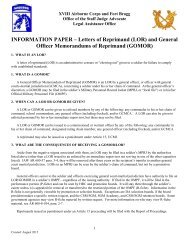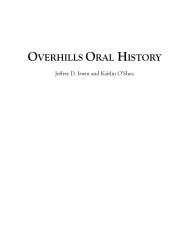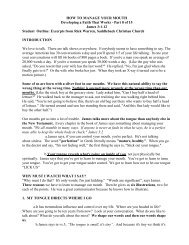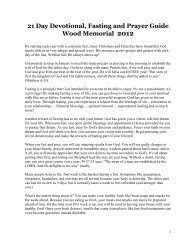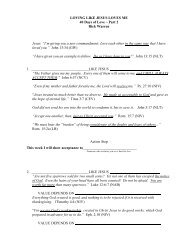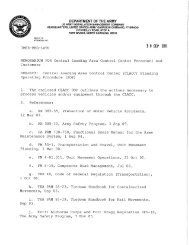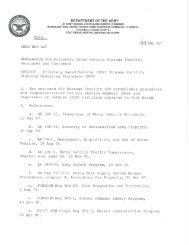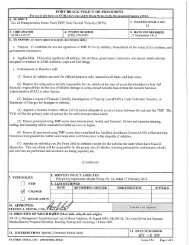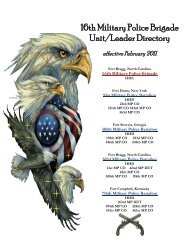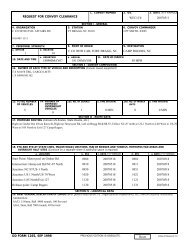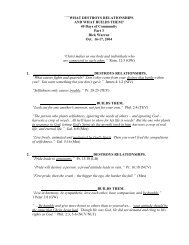Articles 120, 120b, 120c, 43, and 118, UCMJ – DoD Proposed ...
Articles 120, 120b, 120c, 43, and 118, UCMJ – DoD Proposed ...
Articles 120, 120b, 120c, 43, and 118, UCMJ – DoD Proposed ...
Create successful ePaper yourself
Turn your PDF publications into a flip-book with our unique Google optimized e-Paper software.
<strong>Articles</strong> <strong>120</strong>, <strong>120</strong>b, <strong>120</strong>c, <strong>43</strong>, <strong>and</strong> <strong>118</strong>, <strong>UCMJ</strong> <strong>–</strong> <strong>DoD</strong> <strong>Proposed</strong> NDAA FY 11 Amendments, as<br />
included in S. 3454 by Senate Armed Services Committee, June 4, 2010<br />
Sexual act includes penetration of the vulva by the penis, <strong>and</strong> penetration of the vulva by any<br />
other part of the body or by a foreign object.<br />
Sexual contact is exp<strong>and</strong>ed to include touching any part of the body with sexual intent.<br />
Touching may be accomplished by any part of the body, including the h<strong>and</strong>s or the mouth.<br />
Bodily harm is clarified to better explain that an offensive touching includes any sexual act or<br />
contact performed without consent. The definition of grievous bodily harm is unchanged.<br />
Force: This definition was simplified <strong>and</strong> the overlaps with ―threaten or place another person in<br />
fear‖ were reduced or eliminated to simplify charging decisions. The Military Judges‘<br />
Benchbook definition of ―unlawful force‖ from Article 128, Assault, was added.<br />
Threatening or placing that other person in fear: This definition was greatly simplified <strong>and</strong><br />
the overlaps with force were reduced or eliminated to simplify charging decisions. The ability to<br />
carry out the threat was removed as a proof requirement for the government.<br />
Consent: The definition of consent was left generally unchanged. The restrictions on the use of<br />
evidence of consent were deleted. The circular language in the current law using nearly the same<br />
words to explain the interaction of consent <strong>and</strong> capacity, as were used to define an offense under<br />
Sexual Assault, was deleted. The Constitutional <strong>and</strong> other legal issues that have developed in<br />
litigation regarding Article <strong>120</strong>, as amended in 2007, are resolved. The treatment of consent is<br />
simplified <strong>and</strong> may be disputed where it is relevant. Categories of persons who may not legally<br />
give consent to sexual acts or contact are set forth within the statute to simplify the matters at<br />
issue in court. For example, the proposed change makes it clear that sleeping or unconscious<br />
persons cannot consent. At least two court members‘ panels within the last year have acquitted<br />
in sexual assault cases due to confusion over this issue. Persons subjected to a fraudulent<br />
representation of a professional purpose to accomplish the act, or under the belief that the person<br />
committing the act is another person, cannot consent because they do not underst<strong>and</strong> to what<br />
they are consenting. Lack of consent was made a permissive inference based on the<br />
circumstances of the offense.<br />
Subsection (b): NEW ARTICLE <strong>120</strong>b:<br />
Purpose of proposed changes: This section (Article <strong>120</strong>b) of the proposed three-section<br />
modification of Article <strong>120</strong> covers sexual offenses against children (any person who has not<br />
attained the age of 16 years). It simplifies the language in the current Article <strong>120</strong> for rape of<br />
children over 12 to make the requirements for proving such a rape appropriate to children rather<br />
than the current st<strong>and</strong>ard of a reasonable adult victim. The definitions of prohibited sexual acts,<br />
sexual contact, <strong>and</strong> lewd acts are broadened to cover all possible sexual offenses against children<br />
currently covered under several confusing <strong>and</strong> disparate subsections of Article <strong>120</strong>. It should be<br />
noted that what would be a fourth section to Article <strong>120</strong> offenses, Article <strong>120</strong>a, ―Stalking,‖<br />
already exists.<br />
Specific provisions:



